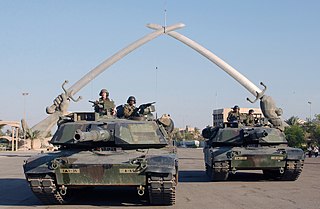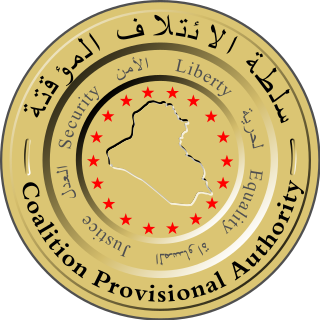Iraq is a federal parliamentary representative democratic republic. It is a multi-party system whereby the executive power is exercised by the Prime Minister of the Council of Ministers as the head of government, the President of Iraq as the head of state, and legislative power is vested in the Council of Representatives.

The Occupation of Iraq (2003–2011) was characterized by a large United States military deployment on Iraqi territory, beginning with the US-led invasion of the country in March 2003 which overthrew the Ba'ath Party government of Saddam Hussein and ending with the departure of US troops from the country in 2011. Troops for the occupation came primarily from the United States, the United Kingdom, and Australia, but 29 other nations also provided troops, and there were varying levels of assistance from Japan and other countries, as well as tens of thousands of private military company personnel.

The following is a timeline of major events during the Iraq War, following the 2003 invasion of Iraq.

The Iraqi Governing Council (IGC) was the provisional government of Iraq from 13 July 2003 to 1 June 2004. It was established by and served under the United States-led Coalition Provisional Authority (CPA). The IGC consisted of various Iraqi political and tribal leaders who were appointed by the CPA to provide advice and leadership of the country until the June 2004 transfer of sovereignty to the Iraqi Interim Government.
Events in the year 2004 in Iraq.

Ghazi Mashal Ajil al-Yawar is an Iraqi politician. He was the vice president under the Iraqi Transitional Government in 2006, and was interim president of Iraq under the Iraqi Interim Government from 2004 to 2005. He also served as the president of the Governing Council of Iraq in 2004 following the US-led coalition invasion.

Ayad Allawi is an Iraqi politician. He served as the vice president of Iraq from 2014 to 2015 and 2016 to 2018. Previously he was interim prime minister of Iraq from 2004 to 2005 and the president of the Governing Council of Iraq in 2003.

Mowaffak Baker al-Rubaie is an Iraqi politician, and was Iraq National Security Advisor in the government of Prime Minister Ayad Allawi and in 2005–2006 Prime Minister Ibrahim Al Jaafari and 2006–2009 Prime Minister Nouri al-Maliki. He was elected to the Iraqi Council of Representatives in December 2005 as a nominee of the United Iraqi Alliance and from 2014–2018 in the Iraqi Parliament.

The Mahdi Army was an Iraqi Shia militia created by Muqtada al-Sadr in June 2003 and disbanded in 2008.

After the 2003 invasion of Iraq was completed and the regime of Saddam Hussein was toppled in May 2003, an Iraqi insurgency began that would last until the United States left in 2011. The 2003–2006 phase of the Iraqi insurgency lasted until early 2006, when it escalated from an insurgency to a Sunni-Shia civil war, which became the most violent phase of the Iraq War.
The General Security Directorate (GSD) was the intelligence agency of Iraq. Although details on its organisation were not made clear at the time, the General Security Directorate's designated mission was to "infiltrate and annihilate Iraq's tenacious insurgency".
Events in the year 2005 in Iraq.

Hajim Mahdi Saleh al-Hassani to a prominent family is an Iraqi politician and was the speaker of the Iraqi National Assembly under the Iraqi Transitional Government. A moderate Sunni Arab and relative outsider, having spent much of his life in the United States, al-Hassani was tapped as a compromise candidate for the speaker's post after weeks of deadlock between Iraqi political parties. al-Hassani had previously been a member of the Iraqi Islamic Party in exile and was Industry Minister under the interim government of Iyad Allawi.

Falah Hassan al-Naqib is an Iraqi politician and was the Minister of Interior under the Iraqi Interim Government.

The Wolf Brigade, since 2006 officially Freedom Brigade, is a unit of roughly 2,000 special commando police officially under the Iraqi Ministry of the Interior.
In the aftermath of the 2010 election, great attention was given to the decision on who should be the next Iraqi PM. Both al-Iraqiyya's Allawi and the State of Law coalition's al-Maliki laid claim to the post, so it was seen as up to the Kurdish parties and the Iraqi National Alliance to decide this matter.

The departure of US troops from Iraq in 2011 ended the period of occupation that had begun with the U.S.-led invasion in March 2003. The time since U.S. withdrawal has been marked by a renewed Iraqi insurgency and by a spillover of the Syrian civil war into Iraq. By 2013, the insurgency escalated into a renewed war, the central government of Iraq being opposed by ISIL and various factions, primarily radical Sunni forces during the early phase of the conflict. The war ended in 2017 with an Iraqi government and allied victory, however ISIL continues a low-intensity insurgency in remote parts of the country.

A series of demonstrations, marches, sit-ins and civil disobedience took place in Iraq from 2019 until 2021. It started on 1 October 2019, a date which was set by civil activists on social media, spreading mainly over the central and southern provinces of Iraq, to protest corruption, high unemployment, political sectarianism, inefficient public services and foreign interventionism. Protests spread quickly, coordinated over social media, to other provinces in Iraq. As the intensity of the demonstrations peaked in late October, protesters' anger focused not only on the desire for a complete overhaul of the Iraqi government but also on driving out Iranian influence, including Iranian-aligned Shia militias. The government, with the help of Iranian-backed militias responded brutally using live bullets, marksmen, hot water, hot pepper gas and tear gas against protesters, leading to many deaths and injuries.

Between the parliamentary election in October 2021 and October 2022, there was a political crisis in Iraq, with members of the Council of Representatives of Iraq being unable to form a stable coalition government, or elect a new President. Basic government services such as the civil service and military continued functioning, but the national political system was in deadlock including in respect of almost all major spending and taxation issues. On 27 October 2022, the government of Prime Minister Mohammed Shia' Al Sudani was approved by the Council of Representatives.
















